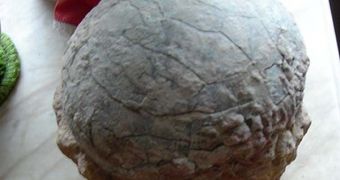In a groundbreaking discovery that could potentially unlock the mystery surrounding the disappearance of dinosaurs, experts in India have uncovered an ancient dinosaur spawning ground, featuring hundreds of clusters of eggs. Initial estimates place the fossilized remains at about 65 million years in the past, although more tests need to be conducted before a final age is established. The find was made in the Indian state of Tamil Nadu, as experts were searching for a suitable place to excavate an ancient riverbed, the BBC News reports.
As investigators dug deeper and deeper into the riverbed, they eventually came across some peculiar, round formations, which they labeled as dinosaur eggs. They snapped photos of the formations, and then sent them to a number of universities and experts. All of them returned with the same answer – these were, indeed, fossilized eggs from the largest lizards that ever lived. “The important finding is that these eggs have been found in different layers that means the dinosaurs came to the place over and over year after year,” MU Ramkumar, the leader of the team that made the discovery, told the BBC News.
“The second important thing is that we have got volcanic ash deposits on the eggs which suggests that volcanic activity could have caused their extinction. The other thing we have found is that all these eggs are unhatched and infertile. So what made the eggs infertile? We need to carry out further studies to learn more from the findings,” the expert added. Indeed, discovering that all of the eggs were infertile has had experts thinking of possible explanations. If a comet or meteor indeed struck the planet, then there would be no repercussions on the eggs themselves, if they were laid before the estimated impact date.
Paleontologists believe that the remains may have belonged to the docile, leaf-eating Sauropods, a branch of the dinosaur order that had extremely large members. They are known to have been spread around the globe, as evidenced by the fact that their fossils have been recovered from every possible continent, including Antarctica. Ramkumar already launched a plea with the local and federal governments to protect the area, which he describes as a “Jurassic treasure trove.” Evidence of fossils in the region was first discovered by British experts in the 1860s.

 14 DAY TRIAL //
14 DAY TRIAL //